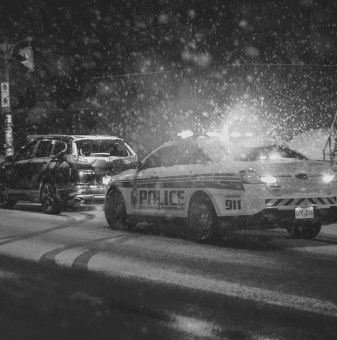What is a Welfare Check?
Have you been wondering, “What is a welfare check?” Police Brutality Center explores the risks associated with welfare checks. Too many police welfare checks become confrontational, ending in violence and unnecessary death. Learn when to utilize a police welfare check, how to request one, and what to expect from the police. Also, learn how to protect your loved ones from police brutality during the process and alternatives to police welfare checks.
Were you or a loved one a victim of police brutality?
Attorneys that work with Police Brutality Center may be able to assist you.
"*" indicates required fields
Content Last Updated: November 8, 2025
In theory, welfare checks are an excellent community resource meant to help vulnerable members of society. When police officers conduct welfare checks, they do not act in a law enforcement role. Instead, they take on the role of community assistance.
Unfortunately, there have been many instances of officers blurring the lines between these roles. Sometimes, the very people whose welfare is in question become victims of police brutality. In the worst scenarios, these victims suffer fatalities.
Police Brutality Center is committed to educating you about the risks of police violence and the risks associated with welfare checks. Understanding how an innocent-sounding community service can result in suffering and death can help you protect your loved ones.
What Is a Welfare Check by Police?
You may have heard that police can perform welfare checks, but what is a welfare check? It is helpful to first understand the basic definition and then explain how you or someone you know may be affected by a police welfare check.
Definition of Police Welfare Check
A welfare check, also known as a “wellness check,” is a public service you can request of police officers if you believe someone you know may be in danger. The officer will visit the person to ensure they are not in trouble.
When the police perform these checks, it falls outside the boundaries of “law enforcement.” The officers involved are generally not investigating crimes but acting as a community resource. Unfortunately, there are many examples of police using excessive force during welfare checks in recent years. In the U.S., police violence statistics have consistently shown that at least 1,000 people are killed annually during interactions with police officers.
When Would Someone Request a Welfare Check?
There are many reasons you might request a welfare check. Generally, welfare checks are requested when you are worried about someone you know. Your worry could stem from the person’s nonresponsiveness, mental health, disability, or other legitimate concerns.
Concerns for the Elderly
If you have an elderly friend or relative who lives alone, you may be worried about what could happen to them. If they were to become sick or injured, it could be days before anyone noticed.
A wellness check can reassure you of your loved one’s well-being. It can also help your loved one feel safe, knowing that someone can check in on them if needed. You can schedule a routine wellness check to monitor their safety and condition by contacting your local police.
For example, if you notice you have not seen your elderly neighbor recently and they have not collected their mail, it would be wise to request a welfare check. They could need help.

Nonresponsive Individuals
Nonresponsiveness is a common cause for a welfare check. If you cannot reach someone, it could indicate they are in trouble. Before scheduling a welfare check, you can check with mutual acquaintances to see if anyone has had recent contact. Social media can also indicate an issue if the nonresponsive person is normally active online.

Potentially Suicidal Individuals
If you have reason to believe someone you know is suffering from suicidal thoughts, a welfare check is a wise decision. Mental illness can affect anyone. It is important to act quickly if you suspect someone is contemplating suicide. If officers conduct a welfare check in time, it could save their life and enable them to get the mental health support they need.
What Happens During a Police Welfare Check?
A welfare check done with proper care can comfort and reassure everyone involved. The process for police welfare checks may vary slightly from jurisdiction to jurisdiction, but they generally proceed in the following manner:
Determine the urgency of the wellness check. If you believe someone is in immediate danger, call 911. Otherwise, you can request a welfare check by calling the local non-emergency police number.
You will provide dispatch with details about the situation and explain why you believe a welfare check is necessary.
If you are requesting a police welfare check for a mental health crisis, clearly state this fact. Request a response from an officer with mental health training. At the end of the call, ask the dispatcher to repeat the information back to you to ensure they understand the situation is a mental health crisis.
Dispatchers will send police officers to perform the welfare check.
The officers will attempt to make contact. If unsuccessful, they may speak with neighbors or investigate for signs of forced entry or other worrisome activity.
If the officers cannot contact the party to complete the welfare check, they may enter the premises. They may enter the home without a warrant if they reasonably believe someone inside needs help.
If the officers find the person in good health, they will notify you.
If the officers find the person needing help, they will provide immediate medical assistance or call for medical transportation. They will also contact you to come to the scene.
If any foul play is suspected, the police will conduct a criminal investigation.
Can Police Force Entry During a Welfare Check?
The police can force entry without a warrant during a welfare check if they have sufficient reason to believe someone inside is hurt, in imminent danger, or needs aid.
If you do not want the officers to enter your home, you may succeed in stopping them, depending on the situation. You can step outside your home, close the door, and assure the officers that you are fine and do not want them to enter your home. The officers may leave if they find no reason to believe anyone else is in danger. They may also need to see your proof of identity.
Instances of Police Brutality During Welfare Checks
Unfortunately, not all police officers conduct welfare checks with care. There are many cases where routine welfare checks end in police brutality.
Examples of police violence during wellness checks include the following:

Trevor Mullinax, a 29-year-old white man, was fired at 50 times and struck by nine bullets in 2021 as South Carolina police conducted a suicide wellness check. His mother was standing beside his truck and speaking with him when the officers opened fire. She had to dive backward to avoid getting shot.
Atatiana Jefferson, a 28-year-old black woman, was babysitting her 8-year-old nephew when she was shot and killed by a Texas police officer conducting a wellness check in 2019. When her neighbor noticed the home’s door was open, he requested a police wellness check.
Travis Jordan, a 36-year-old black man, was killed by Minneapolis police in 2018 after his girlfriend called 911 and expressed fear that he may commit suicide.
John Albers, a 17-year-old white boy, was killed in 2018 by a Kansas police officer responding to a welfare check request. His friends requested the check after Albers posted threats to hurt himself on social media.
Magdiel Sanchez, a 35-year-old deaf Latino man, was fatally shot in 2017 by Oklahoma City police despite witnesses yelling that he was deaf and could not hear their orders.
Sandy Guardiola, a Latina woman, was shot in 2017 by a New York police officer during an unspecified wellness check. The officer entered her home without permission and shot her three times while she lay in bed.
Albert Chatfield, an 86-year-old black man suffering from dementia, was tasered in 2017 by South Carolina police who did not want him to wander into traffic and get hit by a car.

Like other police brutality interactions, implicit bias and racial profiling can impact how officers conduct wellness checks. Implicit bias can affect how officers react to perceived threats, even when none exist.
Can You Call Someone Other Than the Police for a Welfare Check?
There is a risk of police brutality during a routine welfare check. Some suggest careful consideration before requesting a welfare check on someone with a disability, mental impairment, or other condition limiting the ability to communicate, understand, or comply with police orders.
If you are worried about a loved one you have not heard from recently, you could ask a mutual friend to check on them. If your state employs mental health professionals in a Police-Mental Health Collaboration, you can make clear that your loved one should be seen by a professional with mental health training.
Other potential options include calling 988 Suicide & Crisis Lifeline or searching for local community-based alternatives to the police.
Some opponents of police welfare checks advocate for defunding the police and reallocating funds to mental health resources. These efforts would see mental health welfare checks handled by professionals specially trained to handle mental health crises.
If you’ve been a victim of police brutality during a wellness check, you can reach out to a police brutality lawyer to discuss your legal options.
